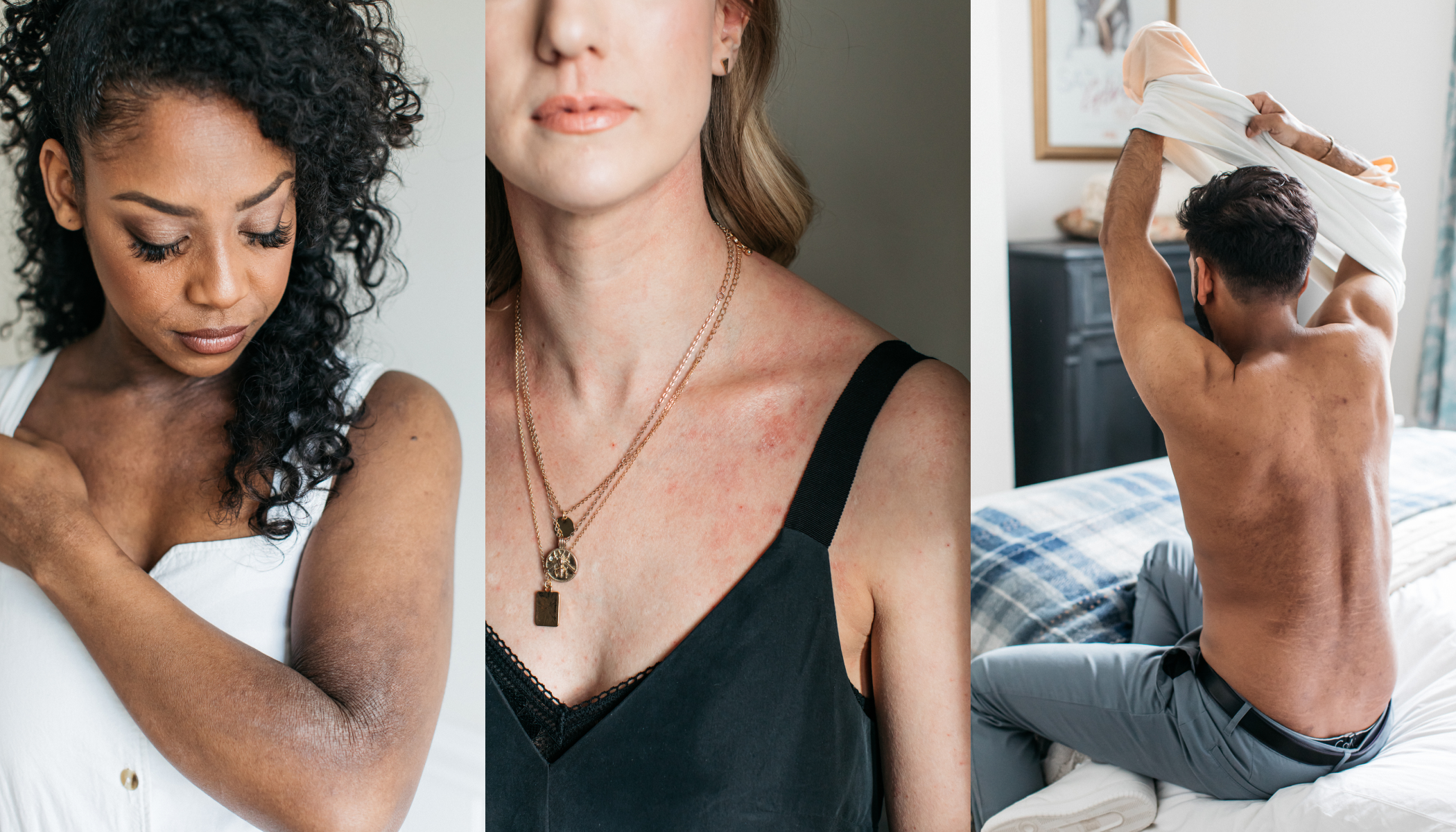Dealing with eczema can be incredibly difficult and unpredictable. Eczema is an inflammatory skin condition that makes your skin red, dry, itchy, cracked and sore.
The condition is more common than you might think, affecting an estimated 1 in every 5 children and up to 3% of adults worldwide.
‘A flare-up occurs when eczema symptoms worsen,’ says Dr Rhianna McClymont, Lead GP at Livi. ‘For some people, there’s no apparent reason, but individual triggers may include soaps and detergents, cold and dry weather, allergies, or infections.’
What does eczema look and feel like?
Eczema flare-ups can affect any part of the skin, but the areas most commonly affected tend to be the face, the hands and the sensitive areas of skin around the joints, such as the back of the knees or inside the elbows.
‘Typically, eczema appears as patches of itchy and cracked, scaly or peeling skin that can feel rough to the touch,’ explains Dr McClymont. Sometimes the skin may also appear blistered, weepy, thickened, crusty, bumpy or swollen.
What does eczema look like on white, black and brown skin?
Eczema affects people of all skin tones and ethnicities and it can look different depending on your skin type. ‘On lighter skin tones, affected areas usually appear inflamed and red in colour with dark pink patches,’ says Dr McClymont.
‘On darker skin tones, affected areas of skin may appear darker than the rest – this is known as hyperpigmentation. Eczema patches tend to look purple, dark brown or ashen grey.’ As the skin heals, it may temporarily become lighter, known as hypopigmentation.
Black skin may be particularly susceptible to eczema, but the severity of flare-ups is often underestimated as the redness from inflammation may be difficult to see.

How do I know if I have an infection?
If your skin becomes swollen or sore, begins to blister or develops a yellow crust, you may have an infection. Antibiotic creams or tablets may be required to treat it.
What causes an eczema flare-up?
There are a variety of potential triggers for eczema flare-ups, from soaps and detergents to wool, sweat, stress and skin infections. Environmental factors, such as smoke, pollen, heat, low humidity and cold weather, and certain foods, such as dairy and nuts, could also be the cause.
How can I manage and ease eczema flare-ups?
Not all treatments work for everyone with eczema, but it’s important not to give up hope. Depending on the severity, treatments may include lifestyle changes, prescription medication and over-the-counter remedies.
Here are some options you can try to help manage your symptoms during an eczema flare-up:
1. Resist the urge to scratch
‘Scratching can make eczema worse and eventually lead to dry, leathery and thickened skin. It may also leave you vulnerable to infection since it’s easier for bacteria to get into cracked skin,’ says Dr McClymont. ‘Keep kids’ fingernails short and try putting mittens on their hands at night. A doctor might recommend antihistamines for a short time, as some types are sedating and can help your child sleep.’
2. Moisturise your skin regularly with emollient
Using moisturising treatments (emollients) regularly is one of the most effective ways to manage your eczema. Available over the counter as creams, lotions or bath oils, emollients cover your skin with a protective film to trap in moisture.
‘Apply emollients liberally twice every day – even when your skin appears “normal” – to prevent flare-ups occurring,’ advises Dr McClymont. ‘When your skin is worse, use them more frequently – up to 5 or 6 times a day. It’s also important to use emollients each time you wash your hands.’
3. Consider using steroid creams for a short period
Steroid creams – also known as topical corticosteroids – can be used to reduce swelling, redness and itching. ‘If the severity of your flare-up isn’t improving with regular emollient use, steroid creams can be useful in the short term as they reduce inflammation in the skin,’ says Dr McClymont.
‘You can buy a mild steroid cream, such as hydrocortisone, over the counter from a pharmacy, and stronger creams are available with a prescription from a GP. In rare cases of severe eczema, oral steroid tablets may be considered.’
4. Pinpoint your triggers
‘Most people have individual triggers, and it’s worth keeping note of when your eczema is at its worst to identify skin products, environmental factors or foods that may aggravate it,’ says Dr McClymont. Try keeping a diary to help you become aware of potential things to avoid.
5. Find support to help you deal with stress
Emotional stress can trigger eczema symptoms, and a recent clinical study found that people with eczema have an increased risk of developing depression and anxiety. ‘If your eczema is affecting you, talk to a doctor. Treatments like cognitive behavioural therapy (CBT) can help manage your response to stress and reduce the impact living with eczema has on your mental health,’ explains Dr McClymont.
6. Discover the benefits of light therapy
Already tried all of the above? Light therapy could be an effective option, but you will need a referral to a dermatologist. ‘Light therapy, or phototherapy, is a treatment that uses ultraviolet (UV) light. It works by reducing inflammation in the skin,’ says Dr McClymont.
7. Talk to a specialist
If your eczema symptoms are getting worse, your doctor or dermatologist may recommend other treatments, including specialised creams called topical immunomodulators. These act on the immune system to reduce skin inflammation and improve eczema. ‘They can be very effective and a good alternative to steroid creams – particularly in people who have frequent flare-ups,’ says Dr McClymont.
Using bandages and wet wraps can also help calm eczema flare ups and are usually applied or prescribed by a doctor or dermatologist. They stop you from scratching and protect your skin from dryness by helping it absorb emollients.
This article has been medically reviewed by Dr Rhianna McClymont, Lead GP at Livi.

